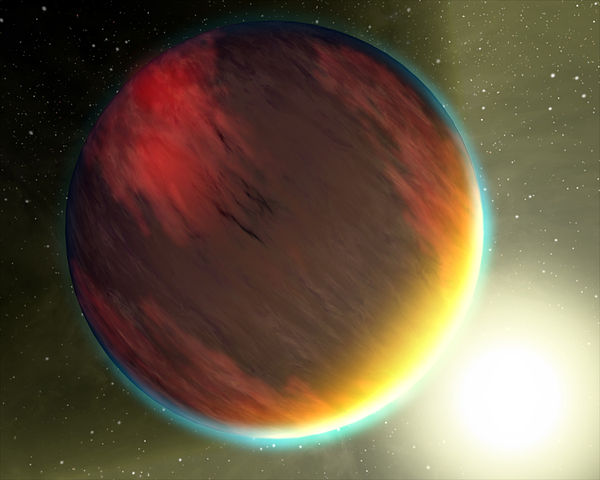
File:Exotic Atmospheres.jpg

| |
This is a file from the Wikimedia Commons. Information from its description page there is shown below.
Commons is a freely licensed media file repository. You can help. |
Summary
| Description |
English: The new finding follows the detection of these same organic molecules in the atmosphere of another hot, giant planet, called HD 189733b, by astronomers using Hubble and Spitzer data. Astronomers can now begin comparing the chemistry and dynamics of these two planets, and search for similar measurements of other candidate exoplanets, advancing toward the goal of being able to characterize planets where life could exist.
|
| Date | 20 February 2007, 15:25:03 |
| Source | http://www.nasa.gov/mission_pages/spitzer/multimedia/spitzer-20091020.html |
| Author | NASA |
Licensing
| Public domainPublic domainfalsefalse |
 |
This file is in the public domain because it was solely created by NASA. NASA copyright policy states that "NASA material is not protected by copyright unless noted". (See Template:PD-USGov, NASA copyright policy page or JPL Image Use Policy.) |
 |
 |
Warnings:
|
File usage
Metadata
| Image title |
|
|---|---|
| Author | Spitzer Space Telescope |
| Copyright holder | http://www.spitzer.caltech.edu/Media/mediaimages/copyright.shtml |
| Date and time of data generation | 20 October 2009 |
| Width | 3,000 px |
| Height | 2,400 px |
| Bits per component |
|
| Compression scheme | LZW |
| Pixel composition | RGB |
| Orientation | Normal |
| Number of components | 3 |
| Horizontal resolution | 300 dpi |
| Vertical resolution | 300 dpi |
| Data arrangement | chunky format |
| Software used | Adobe Photoshop CS3 Macintosh |
| File change date and time | 14:53, 5 June 2009 |
| Colour space | sRGB |
| Contact information |
http://www.spitzer.caltech.edu 1200 E. California Blvd. Pasadena, CA, 91125 USA |
| Short title |
|
| Credit/Provider | NASA/JPL-Caltech/T. Pyle (SSC) |
| Headline | The basic chemistry for life has been detected in a second hot gas planet, HD 209458b, depicted in this artist's concept. Two of NASA's Great Observatories - the Hubble Space Telescope and Spitzer Space Telescope, yielded spectral observations that revealed molecules of carbon dioxide, methane and water vapor in the planet's atmosphere. HD 209458b, bigger than Jupiter, occupies a tight, 3.5-day orbit around a sun-like star about 150 light years away in the constellation Pegasus. Planets like this one, which circle stars beyond our sun, are called exoplanets. |
| Source | Spitzer Space Telescope |
| IIM version | 2 |
Want to know more?
SOS Children's Villages chose the best bits of Wikipedia to help you learn. SOS Children's Villages works in 133 countries and territories across the globe, helps more than 62,000 children, and reaches over 2 million people in total. Help another child by taking out a sponsorship.
